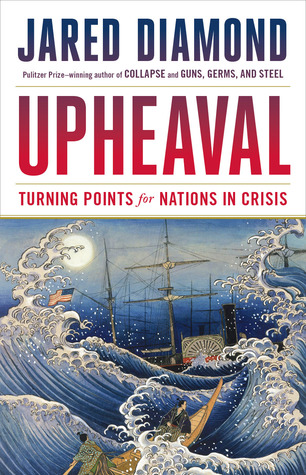More on this book
Community
Kindle Notes & Highlights
Read between
August 5 - August 13, 2020
For instance, therapists have found it helpful to define a quality of individuals termed “ego strength.” While nations don’t have psychological ego strength, that concept suggests a related concept important for nations, namely, “national identity.”
The German philosopher Friedrich Nietzsche expressed a similar idea by his quip “What doesn’t kill us makes us stronger.” Winston Churchill’s corresponding quip was “Never let a good crisis go to waste!”
Ego strength means having a sense of yourself, having a sense of purpose, and accepting yourself for who you are, as a proud independent person not dependent on other people for approval or for your survival. Ego strength includes being able to tolerate strong emotions, to keep focused under stress, to express yourself freely, to perceive reality accurately, and to make sound decisions.
For example, the great Italian Jewish author Primo Levi, who did survive Auschwitz, said afterwards, “The experience of Auschwitz for me was such as to sweep away whatever legacies of my religious education that I had retained.
The Finnish language formed the core of the Finnish national identity for which so many Finns were willing to die in their war against the Soviet Union.
But those efforts of Dutch ethical policy produced limited results—partly because the Netherlands itself was too small to put much money into Indonesia; and partly because the efforts of the Dutch, as well as of subsequent independent Indonesia, to improve people’s lives were frustrated by rapid population growth, creating more mouths to feed. Indonesians today consider the negative effects of Dutch colonialism far to have outweighed the positive effects.
Their actions against the Dutch nevertheless reached the point that in the 1920’s the Dutch adopted a policy of repression and sent many of the leaders to what was in effect a concentration camp, in a remote disease-plagued area of Dutch New Guinea.
Once Germany had been unified in 1871, leaving millions of German-speaking peoples outside its borders, Bismarck was realistic enough to understand that he had achieved the most that was possible, and that other powers would not tolerate further German expansion.
To understand the fundamental benefits of an immigrant population, imagine that you could divide the population of any country into two groups: one consisting on the average of the youngest, healthiest, boldest, most risk-tolerant, most hard-working, ambitious, and innovative people; the other consisting of everybody else. Transplant the first group to another country, and leave the second group in their country of origin.
That’s because Nobel Prize–winning research demands those same qualities of boldness, risk tolerance, hard work, ambition, and innovativeness.
I agree that the steps to a military dictatorship in the U.S. would be different from the steps that were taken in Chile in 1973. The U.S. is very unlikely to suffer a take-over by our military acting independently. I instead foresee one political party in power in the U.S. government or in state governments increasingly manipulating voter registration, stacking the courts with sympathetic judges, using those courts to challenge election outcomes, and then invoking “law enforcement” and using the police, the National Guard, the army reserve, or the army itself to suppress political opposition.
The necessity of investing in one’s future, whether for individuals or for nations, is obvious.
Many people consider U.S. private investment to be high, bold, imaginative, and extremely profitable. It’s relatively easy in the U.S., compared to other countries, to obtain funding to start a new business and to test an idea’s commercial potential.
Offsetting those reasons to feel optimistic about the U.S.’s investment in our future is a reason to feel pessimistic: the decline of American government investment in public purposes, such as education, infrastructure, and non-military research and development; and our large government expenditures for economically unprofitable purposes. Increasingly large segments of the American populace today deride government investment as “socialism.”
As for government funding of education (especially higher education), that has been dropping since at least the turn of the century. Despite our growing population, state funding of higher education has grown at only 1/25th of the rate of state funding for prisons, to the point where a dozen U.S. states now spend more on their prison systems than they do on their systems of higher education.
Where is our money going, if it is not being invested by our government in our own future?
Personal flexibility means that a person is receptive to considering different new approaches to a problem. Personal rigidity means that a person believes that there is only one approach to any problem. That dichotomy has proved important in understanding differences among individuals in their success in resolving crises by devising new approaches.
Do countries require a crisis to motivate them to act, or do nations ever act in anticipation of problems? The crises discussed in this book illustrate both types of responses to this frequently asked question.
At the opposite extreme was the author Leo Tolstoy, who maintained that leaders and generals had minimal influence on the course of history. To make his point, Tolstoy included in his novel War and Peace fictitious accounts of battles in which generals issue orders, but the orders are irrelevant to what is actually happening on the battlefield.


